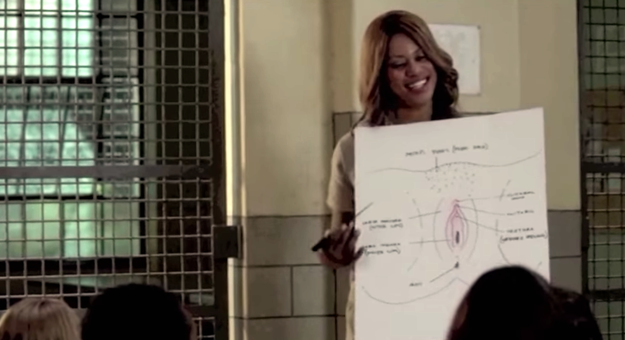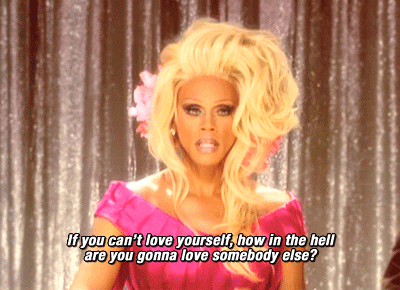The following pieces of advice are meant to apply to all cisgener and transgender individuals — regardless of your age, sexual orientation, or gender identity. That said, not every tip might apply to every person. Have more advice you’d like to share with the class? Go ahead and post it in the comments.
Losing your virginity isn’t just P in the V.
“Theres no universal consensus on what behaviors constitute having sex,” relationship and sex expert Kristen Mark, Ph.D., tells BuzzFeed Life. Not to mention, the notion of “‘virginity’ is very heterocentric. It really excludes a large number of people who may consider themselves as having lost their virginity, but that definition is going to be very different for them.” So losing your v card might involve penetration, or it might involve anal sex, oral sex, manual stimulation, dildos, whatever. There’s no rule that your first time has to meet a specific set of criteria.
That whole “popping the cherry” thing is mostly a myth.

Not every vagina bleeds like a stab wound the first time you have sex. “Some women don’t notice any bleeding at all, but it is true that some women bleed a lot,” sex researcher Debby Herbenick, Ph.D., author of Because It Feels Good, tells BuzzFeed Life. This comes from tearing the hymen, which is basically just tissue inside the vagina. All women have different amounts of hymenal tissue, and in rare cases they aren’t born with any. There’s really no way to predict how much you’ll bleed, so…maybe keep a light on, suggests Herbenick.
Along those lines, a “hymen check” is really no way to determine virginity.

Again, different people have different amounts of hymenal tissue, and some are thinner, worn away, or filled with fewer blood vessels than others. Plus, that tissue can tear from a variety of things, like physical activity, masturbation, fingering, etc., says Herbenick. So to use this as a marker of whether or not you’ve had sex just…doesn’t make sense.
It doesn’t have to hurt.

If your first time involves penetration, a little pain or pressure might be expected. That said, it should still be overall pleasurable — not painful. So if it hurts a lot, stop. This could be a signal that you need more foreplay or lubrication, says Mark.
Getting properly warmed up is a must.

When you know you’re finally going to have sex, most people skip over all the other stuff to get to the main event. Don’t do this. If your goal is vaginal or anal sex, make sure to rack up a few other activities before you go there. Research shows that the more sexual behaviors you engage in, the easier it is for both men and women to orgasm during a hookup.
And if you have a vagina, it’ll make everything way more comfortable. “The way the vaginal canal works is once you’re aroused, something called ‘ballooning’ [or ‘tenting’] occurs, which opens it up and allows for penetration,” says Mark. “If there’s no arousal prior to penetration, it can be painful.” Plus, lots of foreplay can help a guy get a stronger erection, so really, everybody wins.
Lube will make everything so much better.

The experts cannot suggest this enough. Lube is not just for older folks who can’t get wet on their own. We promise. A little extra slickness will help everything feel smoother and more pleasurable — no matter what’s going in where. And especially if you feel any pain while trying penetration for the first time, ADD LUBE.
You should know, though, that silicone-based lubes can screw with condoms and make them less effective. So you should find a water-based lube instead.
Having an orgasm should not be the goal.

Yes, orgasms are fantastic, but don’t just focus on when/how/if you’re going to get there. “Getting to know one another’s bodies is as much a part of the sexual experience as orgasm,” says Mark. “Being able to learn what your partner likes and doesn’t like is part of the fun.” It can take some people literally years before they figure out how to orgasm with another person, so don’t expect it to happen right off the bat.
If you have a vagina, you probably won’t have an orgasm the first time around.

Fifty Shades of Grey lied to you. Unfortunately, research shows that women are just less likely to orgasm during sex than men. That said, there are a few things you can do to increase your chances, like having sex with a familiar partner, engaging in lots of foreplay, and not just focusing on penetration, says Herbenick. Also, like we just mentioned: It really can take YEARS for some people to figure out how to orgasm during sex with another person. So be patient and don’t give up hope.
You’re more likely to have an orgasm if you and your partner are more familiar with each other — physically and emotionally.

Research shows you’re more likely to orgasm in a relationship than in a hookup situation — whether it’s your first time or your 50th time having sex. But losing your virginity in particular is one of those times that the right partner can make a huge difference. “One of the things that’s a good predictor of whether you’ll regret it later or whether you’ll enjoy it is who you lose your virginity with and whether that person has any sort of meaningful tie to you,” says Mark. That doesn’t mean you have to have been together for a long time or even be dating the person, but a sense of trust and comfort with this person will be very helpful.
If you have a penis, you might come really, really quickly.

And that’s totally fine. It’s your first time inside a vagina/mouth/anus, so it’s exciting stuff going on here. But don’t try to stave off an orgasm by thinking about baseball or grandparents or something. Focus on being in the moment and on your partner’s needs, and don’t worry so much about when you’ll come, says Mark. Even if you do finish super quickly, don’t panic — you can just turn your attention to pleasing your partner.
Erectile dysfunction doesn’t just happen to old dudes, so don’t freak out if it happens to you.

Boners don’t always cooperate, and that doesn’t mean you’re broken or you’re horrible in bed. The important thing to know is that this can happen to anyone with a penis (regardless of your age), and that pressure and nerves can definitely play a role, says Mark. If you’re with someone you trust and are comfortable with, that might automatically take some of that anxiety away. If you’re having trouble, take a deep breath, remind yourself that this is normal, and then try to focus on all the stuff that currently feels awesome.
You can definitely get pregnant the very first time you have sex.

Sadly, there are no free passes for virgins. If your first time involves a penis ejaculating inside a vagina, you can absolutely get pregnant, says Herbenick. So before you lose your virginity, think about what kind of birth control you’ll use to protect against pregnancy, and talk about this with your partner…preferably before you’re naked. And you might want to take this quiz about — just so you know.
You should definitely still use a condom.

If not for pregnancy protection, then for STIs — yes, even if you’re both virgins, says Herbenick. Here’s why: People lie. OK, that was a little harsh, but really, there’s always a chance that someone isn’t being totally honest when they say they’ve never had sex before or they’ve only had sex with another virgin or whatever. Plus, people have very different definitions when it comes to sex, and STIs can be spread through genital, oral, anal, and sometimes just skin-to-skin contact. So even if they think they’ve been safe in the past, they might be mistaken.
Read up on here. And if losing your virginity involves oral vaginal or oral anal sex, consider a . Remember, these barrier methods don’t fully protect against all STIs, but they’re your best line of defense.
Whatever you do, don’t try to copy what you saw in porn.

All that violent thrusting and those acrobatic positions aren’t actually things that everyone enjoys, especially not your first go around. “It takes a while to figure out how to do that in a way that feels good,” says Herbenick. Accept that you’re new to this and you’re still exploring, and have fun with that.
It’s not true that your soul will be forever attached to the first person you have sex with.

Sure, you might still look back on them fondly (or not so fondly) when you’re talking to your friends 20 years from now, but you’re not going to be forever attached to this person if you don’t want to be, says Herbenick. This myth might come from the fact that many people do feel some sort of a connection to the person they lost their virginity to, but that’s more of a social construct than a guarantee.
Think of masturbation as practice for the real thing.

It would be a little hypocritical to expect someone to know what feels awesome for you when you don’t even know it yet. “It’s helpful — for women especially — before partnered sex to have an orgasm through masturbation,” says Mark. For some people, it’s going to take time to figure out what you like, what you don’t like, and what actually makes you come. But figuring all this out before you get in bed with someone might make your first time less overwhelming.
Your experience losing your virginity will certainly not dictate the rest of your sex life.

Whether you had a good, bad, or meh first time, you don’t need to worry about it being an omen for what sex will always be like for you. This is especially the case if your first sexual experience involved any form of abuse, assault, or coercion. You are not how you lost your virginity. And remember, you get to decide what “losing your virginity” really means — whether that’s the first time you had consensual sex, the first time you had good sex, or the first time you had any sex.
There’s no right time to have sex.
How and when you decide to do it is no one’s business but your own. You’re not a slut if you choose to lose your virginity, and you’re not a prude if you decide to wait. What’s more important than an arbitrary timeline is doing it for the right reasons and in a context you feel comfortable with, where you are actively consenting. “That you yourself want to — not that you feel pressure from a partner or that all your friends are doing it,” says Mark. “When somebody has sex for the first time for those reasons, they are more likely to regret it.”
Everyone is just as nervous as you are.

You’re naked, they’re naked, things are going in places that definitely haven’t been there before, it’s a whole thing. Relax, breathe, go slow, and remind yourself that being a little anxious is normal.


















